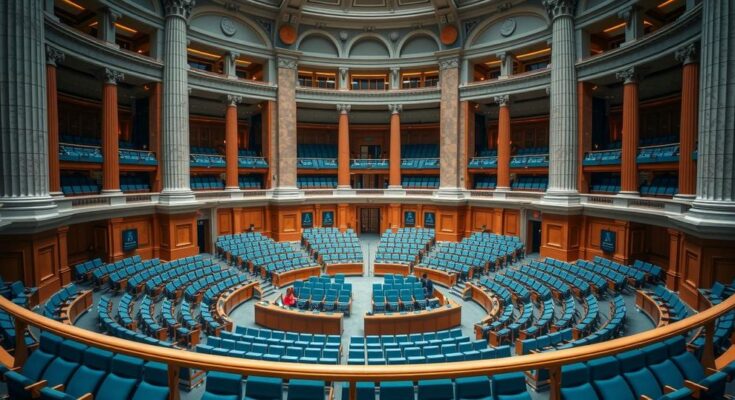The Bundestag, Germany’s lower house, has officially commenced its 21st term, ushering in a complex political landscape. The right-wing AfD party has doubled its representation, now aligned with the radical left, forming a minority bloc capable of obstructing critical constitutional amendments. Incoming Chancellor Friedrich Merz faces the daunting challenge of forming a new government amid these shifting alliances.
With the recent elections concluded on February 23, the conservative Union (CDU/CSU) emerged as the largest faction with 208 seats out of a total of 630. The new configuration, reduced from the previous legislature’s 733 seats, reflects recent electoral reforms. The radical left, Die Linke, has gained significant ground, fortifying the AfD’s position to challenge constitutional changes, such as the debt brake reform, recently laid out by Merz.
In response to the potential hindrances, Merz expedited the parliamentary process to secure the debt brake reform before the new Bundestag’s inauguration. This initiative was crucial for the approval of a new aid package for Ukraine, amounting to €3 billion. The current Bundestag showcases a spectrum of ages among its members, with the youngest being 23-year-old Luke Hoss and the oldest at 84-year-old Alexander Gauland, alongside a gender composition where women represent 32.4% of the members.
Negotiations for the next government, envisioned as a “grand coalition” between conservatives and social democrats, are now crucial. While the CDU leads with hopes of collaboration, the SPD, although at a disadvantage in the polls, holds significant power in these talks, particularly regarding contentious topics like migration and welfare policies. The CDU may find itself weaker in negotiations after achieving reform victories which lessens the SPD’s motivation to compromise.
Merz’s proposed policies signal a tougher stance on asylum, which could align him with the AfD’s views. Nevertheless, the growing pressure on the SPD to avoid political deadlock may foster an atmosphere of cooperation, despite their opposition to tightening asylum regulations. Merz remains optimistic, asserting that “confidence is growing” among negotiating teams, and aims to solidify a coalition agreement by Easter, though the timeline may prove uncertain.
The 21st term of the Bundestag has begun with the post-Nazi AfD doubling its seats, complicating constitutional reforms. CDU leader Friedrich Merz is negotiating a new government, facing challenges from the SPD, while the radical left forms a minority bloc. Key issues include migration policy and coalition stability, with an aim to solidify agreements by Easter.
In summary, the new Bundestag faces a complex dynamic with increased representation from both the AfD and Die Linke, posing challenges for constitutional reform. The CDU’s Friedrich Merz must navigate a fragile coalition-building process, balancing the interests of the SPD and potential alliances with the far-right AfD. As negotiations progress, the emphasis will be on reaching agreements on sensitive topics like migration, with the timeline for finalising these discussions remaining unclear.
Original Source: www.eunews.it



